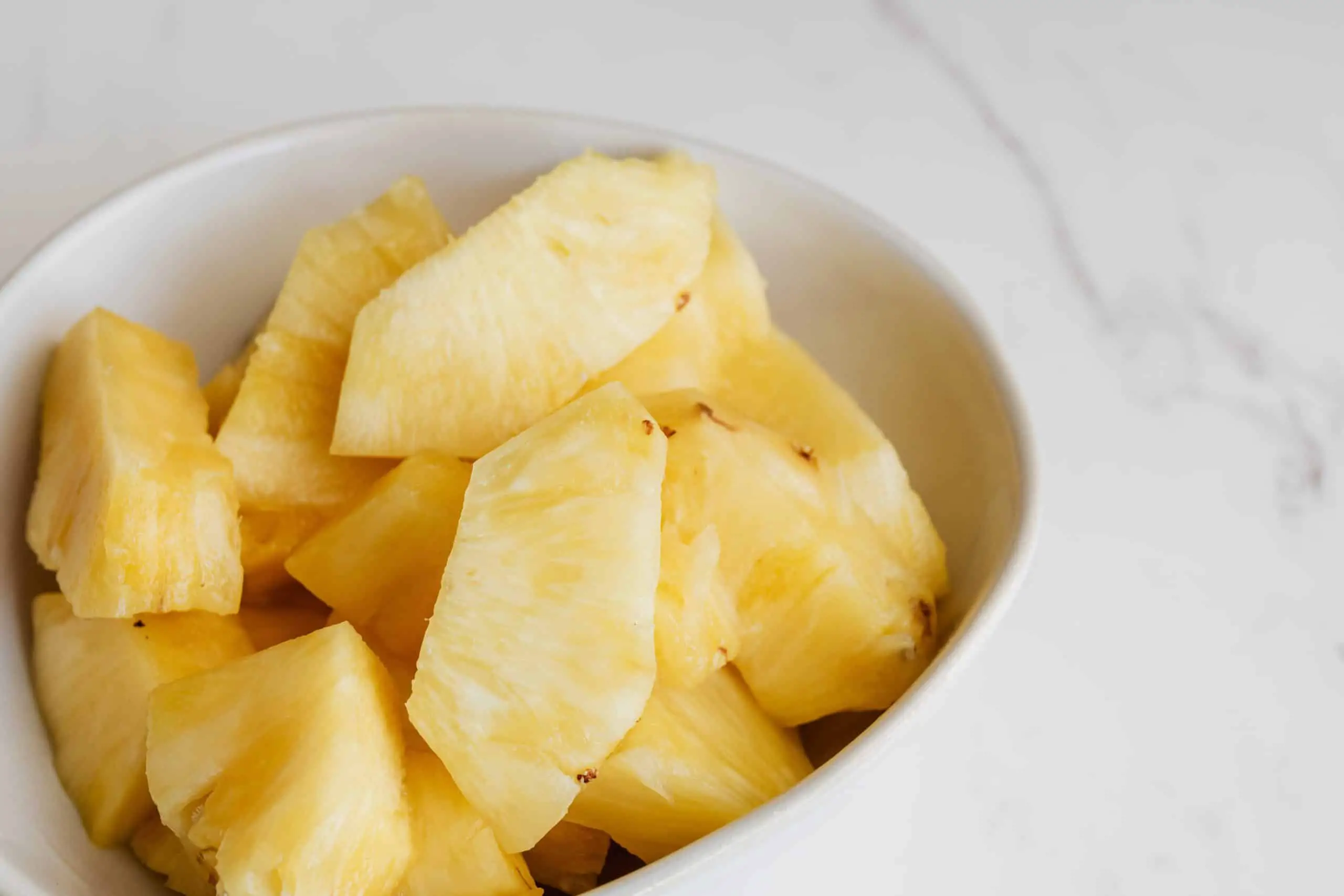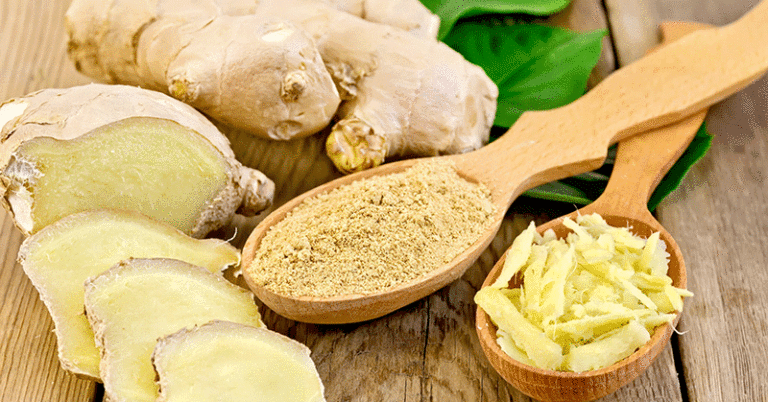People enjoy pineapple in numerous ways, from savoring its natural sweetness as fresh slices or incorporating it into smoothies and fruit salads to incorporating its unique flavor into grilled preparations or tropical salsas. Pineapple’s versatility extends beyond being a controversial pizza topping as a key ingredient in cocktails and desserts.
Whether dried, canned, or juiced, pineapple adds its tangy, tropical essence to a wide array of culinary creations, appealing to various taste preferences and lending its vibrant character to sweet and savory dishes. In addition to its delightful taste and culinary versatility, pineapple also offers notable nutritional benefits.
Pineapple: A Nutritional Powerhouse
Pineapple, one of the most renowned tropical fruits for its delightful flavor blend, has broad nutritional content. This tropical delight is not only refreshing but also offers a range of essential nutrients.
Pineapple is notably rich in vitamin C, containing around 131% of the recommended daily intake. Vitamin C is a potent antioxidant, contributing to immune function and collagen synthesis. [1]
The fruit also contains manganese, an essential trace mineral crucial for enzyme function, bone health, and metabolism. A serving of pineapple offers roughly 76% of the recommended daily manganese intake. [2]
According to the Food and Drug Administration (FDA), if a product is to be labeled as a “high source of fiber,” it needs to contain at least 20% fiber of the recommended daily value. Additionally, to be labeled as a “good source of fiber,” it should have 10–19% of the recommended daily value of dietary fiber in one serving.
Interestingly, a pineapple byproduct that includes the peel and heart of the fruit is rich in fiber. About 76% of this byproduct consists of fiber, which means that pineapple byproduct meets these requirements. [3]
Fiber aids digestion, promotes satiety, and helps maintain healthy cholesterol levels. While pineapple is naturally sweet and contains natural sugars, its glycemic index is relatively low due to the presence of dietary fiber. Additionally, pineapple contains the enzyme bromelain, which has potential anti-inflammatory and digestive benefits. However, the bromelain content varies and is higher in the core and stem of the fruit.
Overall, incorporating pineapple into a balanced diet can offer a refreshing source of vitamins, minerals, and dietary fiber while adding a burst of tropical flavor.
Bromelain: The Key Enzyme in Pineapple and Its Health Benefits
Bromelain, the primary enzyme found in pineapple, holds significant health benefits supported by reliable sources. Derived from the stem and core of the pineapple, bromelain is a mixture of proteolytic enzymes that may aid in protein digestion and the reduction of gastrointestinal discomfort.
Studies suggest that bromelain’s anti-inflammatory effects might have applications in managing conditions like osteoarthritis and sports-related injuries. Furthermore, its potential to enhance wound healing and alleviate sinusitis symptoms has also garnered attention. While bromelain’s precise mechanisms are still under investigation, its reputation as a bioactive compound underscores its role as a key component of pineapple’s potential health-promoting properties. [4]

Zesty Health Benefits of Pineapple-Infused Water
Apart from its tropical taste, this refreshing mix provides numerous health benefits that boost your body and taste great.
Pain Relief and Inflammation Control
Pineapple-infused water showcases a variety of health benefits, with its potential pain-relieving and anti-inflammatory properties standing out.
Bromelain serves as a natural anti-inflammatory agent. This enzyme has been linked to alleviating inflammation in various contexts, including its potential to reduce nasal inflammation in individuals with acute sinusitis, potentially shortening symptom duration. Incorporating pineapple water into your routine may offer a refreshing way to harness these potential benefits for pain relief and inflammation control. [4]
Enhancing Digestive Health
Beyond its delightful taste, pineapple-infused water presents an opportunity to promote digestive health. The bromelain enzymes present in pineapple possess proteolytic properties that could aid in protein digestion, potentially easing digestive discomfort. As bromelain is known to break down proteins, it might contribute to smoother digestion processes. [4]
Strengthening Immunity and Wellness
Rich in vitamin C and manganese, pineapple serves as a natural source of immune-boosting nutrients. Vitamin C contributes to immune function, while manganese plays a role in metabolic processes. Embracing pineapple water as a part of your hydration routine could provide a tasty way to enhance your overall wellness and reinforce your body’s immune defenses. [5]
Aiding Weight Loss and Vitality
Exploring the potential benefits of pineapple-infused water reveals its role in weight management and promoting vitality. With its naturally low-calorie content and hydrating properties, pineapple water can be a satisfying alternative to sugary beverages.
Furthermore, the enzymes in pineapple, such as bromelain, may assist digestion, potentially aiding in maintaining a healthy weight. [6]
Radiant Skin and Heart Health
The virtues of pineapple-infused water extend to the realms of skin health and heart well-being. Packed with vitamin C, pineapple water contributes to collagen formation, promoting skin’s radiance and elasticity. Additionally, its potassium content may aid in maintaining healthy blood pressure levels, supporting heart health. Sipping on pineapple water not only offers a delightful way to stay hydrated but also potentially nourishes both your skin’s glow and your heart’s vitality.
Pineapple Water Tips: Is it Good to Drink Pineapple Water Every Day?
When indulging in pineapple-infused water, striking the balance between moderation and enjoyment is key. While pineapple water offers numerous health benefits, including its potential anti-inflammatory and digestive properties, consuming it in moderation ensures you maintain a balanced diet.
Drinking pineapple water every day can be a healthy choice as part of a balanced diet, given its rich vitamin content, antioxidants, and potential benefits like aiding digestion and providing immune support. However, moderation is key due to the natural sugars present in pineapple, which can contribute to calorie intake. It’s advisable to consult with a healthcare professional before making any significant changes to your daily routine, especially if you have any underlying health conditions or concerns.
Refreshing Recipe for Wellness
Creating a refreshing recipe for wellness is as simple as crafting your own pineapple-infused water!
Ingredients:
- Fresh pineapple slices
- Cold water
- Optional: Mint leaves, ginger slices, or other complementary ingredients
Instructions:
- Rinse and slice a ripe pineapple, removing the skin and core.
- In a pitcher, place pineapple slices and optional ingredients.
- Fill with cold water and cover the pitcher.
- Refrigerate for 2-4 hours or overnight for stronger flavor.
- Serve over ice, including pineapple pieces in each glass.
- Refill the pitcher a few times before replacing pineapple slices. Enjoy!

My Personal RX for Mastering Fruit Juice and Water for Vitality
When it comes to incorporating fruits into your diet, here are my personalized recommendations for getting the best nutrition value from your fruits.
- Diversify Your Plate: Variety is key to obtaining a wide range of nutrients. Explore different fruits across the color spectrum – from the deep blues of blueberries to the vibrant oranges of oranges. Each hue signifies a unique set of vitamins, antioxidants, and phytochemicals contributing to your overall well-being.
- Embrace Whole Fruits: Whenever possible, opt for whole fruits over fruit juices or processed versions. Whole fruits contain fiber, which aids digestion, supports heart health, and helps regulate blood sugar levels. Chewing whole fruits also promotes a sense of satisfaction, helping control portion sizes.
- Seasonal and Local Choices: Selecting fruits that are in season and sourced locally often means you’re getting produce at its peak ripeness and nutritional value. Seasonal fruits are typically fresher and packed with flavor, vitamins, and minerals. Plus, choosing local options supports your community and reduces your carbon footprint.
- Mindful Preparation: How you prepare your fruits can impact their nutritional value. Whenever possible, enjoy fruits in their natural state – washed and unpeeled – to retain the maximum nutrients. If you choose to cook them, consider methods like steaming or baking, which can help preserve nutrients better than boiling.
- Moderation and Balance: While fruits are undoubtedly nutritious, moderation is key. Fruits contain natural sugars, and excessive consumption can lead to an excess of calories. Balance your fruit intake with other nutrient-dense foods, ensuring your overall diet is well-rounded and aligned with your health goals.
- Explore Fun Recipes: There are many ways you can incorporate your favorite fruits into your meals and snacks. Check out my Superfoods Cookbook with 50+ recipes to explore, making cooking healthy dishes at home more enjoyable. Unlock a journey to better health by downloading your FREE copy now.
- Support Your Body: Transform into a healthier version of yourself with Complete Turmeric Matrix. This unique combination of bioactive plant nutrients helps maintain a balanced inflammatory response and fosters a thriving gut environment, resulting in enhanced clinical effectiveness and immune-strengthening advantages.
By incorporating these strategies into your daily routine, you can harness the full spectrum of benefits that fruits offer – supporting your health, vitality, and overall well-being.

Sources:
- Sarkar, T., Salauddin, M., Hazra, S. K., & Chakraborty, R. (2020). The impact of raw and differently dried pineapple (ananas comosus) fortification on the vitamins, organic acid and carotene profile of Dairy Rasgulla (sweetened cheese ball). Heliyon, 6(10). https://doi.org/10.1016/j.heliyon.2020.e05233
- Manganese. Linus Pauling Institute. (2023, March 9). https://lpi.oregonstate.edu/mic/minerals/manganese
- Selani, M. M., Brazaca, S. G., dos Santos Dias, C. T., Ratnayake, W. S., Flores, R. A., & Bianchini, A. (2014). Characterisation and potential application of pineapple pomace in an extruded product for fibre enhancement. Food Chemistry, 163, 23–30. https://doi.org/10.1016/j.foodchem.2014.04.076
- Pavan, R., Jain, S., Shraddha, & Kumar, A. (2012). Properties and therapeutic application of Bromelain: A Review. Biotechnology Research International, 2012, 1–6. https://doi.org/10.1155/2012/976203
- Rathnavelu, V., Alitheen, N. B., Sohila, S., Kanagesan, S., & Ramesh, R. (2016). Potential role of bromelain in clinical and therapeutic applications. Biomedical Reports, 5(3), 283–288. https://doi.org/10.3892/br.2016.720
- El-Shazly, S. A., Ahmed, M. M., AL-Harbi, M. S., Alkafafy, M. E., El-Sawy, H. B., & Amer, S. A. (2018). Physiological and molecular study on the anti-obesity effects of Pineapple (ananas comosus) juice in male Wistar rat. Food Science and Biotechnology, 27(5), 1429–1438. https://doi.org/10.1007/s10068-018-0378–




















